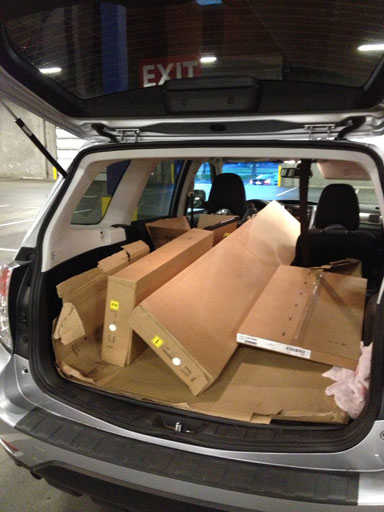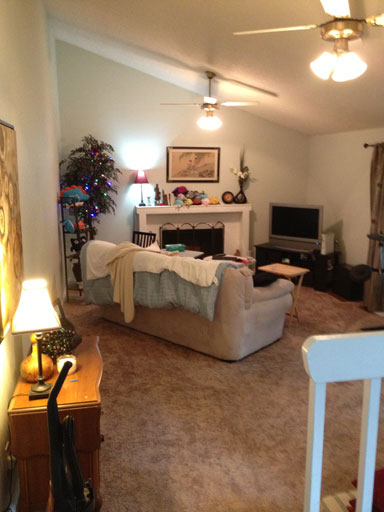Wealthy people just call up a realtor, find a nice-looking house, buy it, and move in. But that’s not us! :D Getting a good deal on a house was the only way for us to leave our apartment and move into a house in the neighborhood of our choice. We had to work a bit harder to get into home ownership.
Fortunately, I grew up in a family that loves a good deal on a house. My parents moved us a couple times as a family and acquired a few investment properties while I was growing up. They love looking at houses, talking about houses, and buying houses when they’re a great deal.
Here’s everything I know about getting a good deal on a house, boiled down to 10 easy rules.
1. Don’t Hurry
I put this rule first because this is really the one rule to rule them all.
Don’t rush into the largest purchase of your life. Don’t let anyone rush you.
The market is not going to run out of houses. Even in the “off season”, even in a “bad market”, people are constantly breaking up, moving cities, and changing jobs. There are always more houses.
When you start looking, 99% of what’s on the market will be stale houses. You won’t find deals among the stale houses, but if you buy in a hurry a stale house is probably what you’ll be buying. Stale houses have sat a while because the deal hunters ruled them out already. No, if you want a deal you want to sit and wait for a fresh house, which brings us to…
2. Be an EXPERT in Your Local Market
Long before you’re ready to buy, start attending open houses in and slightly above/below your price range. (Note: if you’re like us, your price range really has no bottom so you’re just looking at everything in and slightly above your price range).
Look at a good variety of houses. Aim to tour fifty houses before buying.
“Look at 50 houses” was the advice my dad gave me when I set out looking for my first home and wow, was he was right. If I’d bought the first house (or tenth) I’d looked at, I’d have gotten ripped off. When I started my search, I had no idea what houses were a deal and which ones were robbery.
Every market’s different, but I guarantee you the good deals sell within days to people who are experts in their local housing market. If you want a good deal on a house, you must become a master of your local market.
Want more proof? Our home was a new listing deal. We saw it get listed on a Sunday afternoon and knew it was a deal without even stepping foot into it. 2 stories at that price? We’re there. We toured it Monday morning and put in an offer immediately. It was ours Wednesday, and at a price that prompted other realtors in our neighborhood to call our realtor and ask why the house went for so little. (Slightly more awkwardly, all our neighbors seemed to know what a deal we got, too, and all of them brought it up when we met them. Good thing that was three years ago now…)
3. Start Looking Early
Do not wait until your lease is running out to look at houses, you won’t have time to master your local market or really figure out what you like (and don’t like) about houses in your price range.
As soon as you think you might want to buy a house, start going to open houses. Go even if you have 11 months left on your lease. Looking’s free, so have a good look around your potential neighborhoods.
Call a few realtors. Get your savings in order. Learn what you like (and don’t like) in houses. All these things take time.
4. Have a Net Worth of At Least 50% of the House’s Closing Price
This is my own personal rule of thumb, and I think it’s good advice to anyone wondering just how much money they need to have before buying a house.
You’re not ready to buy a $200,000 house until your net worth is $100,000. Houses are expensive and random stuff breaks in them all the time. It it took every penny in your pockets to scrape together a down payment, then the maintenance will bury you. Prove you’re capable of sitting on a pile of money without spending it before you enter home ownership, it will save you a lot of grief.
5. Have 30% of the House’s Closing Price in Liquid Cash at Closing
20% is for the down payment, the other 10% for moving and immediate repairs.
If you got a deal house, it’s probably because there’s some annoying thing(s) wrong with it. In our house, one of those things was the furnace (it didn’t work). Since we were buying in November, a furnace was the first thing to go into the house.
We also had to replace all the carpets and purchase a hardware store’s of tools and paint to get basic repair and painting done before our stuff moved in at Christmas. We spent thousands of dollars after closing but before we even moved in.
PS: I once had a co-worker who asked the boss for a loan to hire movers so she could actually move into her new house. Definitely don’t do that.
6. Know Your Hard Limits
Hard limits are things you just can’t deal with and will never grow to love.
Hard limits are not things that can be changed, like “the light fixtures are ugly”. Hard limits are things that will never change, like the house being too close to a busy intersection or not having enough bedrooms.
Want some examples? Some of our hard limits were:
- No permit-less constructions
- No HOAs (home owners associations)
- Nothing under 1600 sq feet
- Nothing over $325k
- No highways within a mile
Want more? Read my bigger list of things to compromise on (and not compromise on) when buying a house.
It’s okay to tour houses that violate your hard limits as research, but don’t let a nice kitchen fool you into living on a busy street you can’t back out into. You’ll go crazy.
7. Don’t Buy More House Than You Can Afford
If the 2008 recession taught us anything, it’s not to buy more house than you can afford to pay for. Start by knowing your monthly expenses – the more months worth of data you have, the better. A whole year is ideal, because if you’re like me, your months vary wildly.
For the previous year, look at each month’s income (your salary) and spending (credit card bill) and savings (if you don’t have this, don’t buy a house). Is a mortgage payment reasonable? And keep in mind that unless you’re living in some bangin’ apartment, there’s a good chance your mortgage will be higher than your rent.
It’s always better to rent an apartment than it is to stretch your finances too thin for a house.
8. Dump Any Real Estate Agent You Don’t Like
Your agent is your employee, and you are entitled to make them work for you.
Don’t be shy, this is their job. Even if your agent is the nicest person in the world, they secretly want you to buy something ASAP so they get paid and can move on to new customers.
Remember, you’re the one living in the home you buy. If your agent pressures you to just buy something already, or is unreliable, or intimidates you, or if you’re just not comfortable with your agent for any reason, dump, dump, dump.
9. Don’t Pin Your Hopes on a Short Sale
Here’s a dirty secret about short sales: that low list price may not be for real.
We put in an offer on a short sale. Three months later, we heard back: the seller’s realtor wanted $35k more than their list price and our offer. We rejected their counter-offer with some paperwork from our realtor (who was awesome, by the way) to make it extra official and forgot about that house. That low list price wasn’t even for real.
(The real kicker was when a few weeks later, the same week we closed on our house actually, that same seller came back asking if we’d be interested at our offer price. I guess that $35k wasn’t so important now, but that ship had sailed and I’m glad it did because the house we got was way better and $50k less than the one we put that offer in on.)
When people go looking for a deal on housing they often look at foreclosures and short sales.
Yes, they have low list prices.
But they can be extremely frustrating and time consuming (several months, if not a year+) to actually purchase. I’m all for bending over backwards for a deal, but foreclosures and short sales are too much for me.
One more story: We live near a short sale home. It’s identical to half the houses in this neighborhood (houses that sell quickly). It’s still on the market nearly 3 years later.
10. Be Critical (and Realistic)
Walk into every house ready to hate it. Look for problems: bad floor plans, impractical kitchen layouts, too much yard, low water pressure. Be extremely critical. Homes are expensive and moving is expensive, so you’ll be putting up with this one’s crap for a long time. Make sure there isn’t too much crap to put up with.
We looked at houses that would have had lower mortgage payments than the one we ultimately bought, but they came with things I hated. Bad floor plans were everywhere – who puts a water heater next to a toilet?? Why is the master bedroom half the house’s square footage? Why is the toilet in a closet?! Ugh.
We also encountered a lot of “oops, ran out of money!” situations: half-finished kitchen remodels and basement remodels were common. Good luck matching the tile and finishing the project.
We wanted a deal, but we didn’t want a stupid bathroom layout or the hell of finishing someone’s remodeling project.
In Conclusion…
If you can do all this, you’re pretty much guaranteed to get a good deal on your next house. Or, at least, as good a deal as your local market will allow for (good luck if your city is San Francisco or New York).
Just remember to go slow, stalk the market, and be ready to pounce.
Photo credits:
For sale signs: coffeego via photopin cc
Red houses: Images_of_Money via photopin cc
Aerial neighborhood: San Diego Shooter via photopin cc
San Francisco houses: nicolas.boullosa via photopin cc








